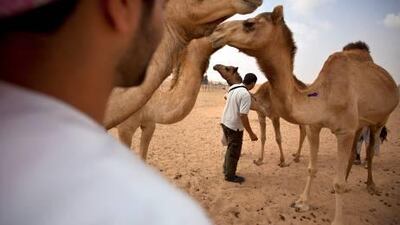ABU DHABI // The European Union has rejected a UAE proposal to export camel milk products there, expressing concern over disease control measures.
This means camel milk will not be exported to Europe for at least another two years, and then only if the UAE meets a checklist of requirements.
MORE UAE NEWS: Our pick of today's top local news stories
Fake goods seized in EU from UAE fall to near zero Counterfeit items flowing from the UAE have dropped to near zero in the past year, officials say. Read article
Dubai police equipped to deal with 'any riots' Police say they are well equipped to deal with any civil unrest that may arise, citing their successful handling of 26 incidents last year. Read article
German tourist fined Dh2,000 for stealing licence plate Tourist who stole licence plate from car at Dubai hotel tells police it was 'a hobby'. Read article
After a request by the UAE last year, a team of European Commission inspectors arrived in late January.
They checked municipal veterinary services in Dubai and Al Ain, the Ministry of Environment and Water's regional office in Al Dhaid and its central laboratory.
They also visited two municipal animal health labs, private labs, markets, a dairy cattle farm and a camel farm, as well as border-inspection posts at a seaport and an airport.
Their report set out nine requirements to be met before camel milk can be exported to Europe.
These include creating an animal health law, new rules for disease controls, improving the organisation of the ministry's labs, increasing transparency and abiding by international standards.
Other requirements include improving disease notification, reinforcing import controls and animal identification.
The inspectors gave the UAE until September 2013 to fulfil the requirements.
Two of the requirements are already in place. The ministry has formed a team to deal with animal health issues and import controls have been strengthened.
"Measures are being taken to export to the EU states," said Dr Nasser Mohammed, the ministry's head of agriculture. "And the UAE will be among the leading states in the region exporting camel milk to Europe."
Dr Mohammed added the country was also interested in "opening up new markets for its animal products, especially markets like the EU".
The inspectors' report, published in May, did not say which camel farm was visited, but only two produce camel milk - the Al Ain Dairy and the Emirates Industry for Camel Milk and Products.
Inspectors said they found "good farming practices" at the farms they visited.
"Records regarding health care and production were kept in good order," their report said.
But the camel farm had been operating for years without a licence because of a bureaucratic glitch.
"In spite of the fact that it had been operating since 2006 and supplying milk for export for several years, the licence was only granted in January 2011," the inspectors wrote.
The report said poor import controls had made it possible for infectious diseases to enter the country, and noted outbreaks of foot-and-mouth disease "are reported from time to time".
Although a federal ministerial resolution bans importing camels from countries that are not free of foot-and-mouth, the report said the ministry issued a permit for such an import on the day the inspectors visited.
The inspectors further noted that if infected animals made it into the country, it would be "virtually impossible" to track them.
Although Abu Dhabi emirate has a system of registering all animals' health history, clinical checks are not recorded nationwide, meaning disease could spread unnoticed, especially from imported animals.
Another problem presented was proving the exported camel milk had been pasteurised. The Central Veterinary Research Laboratory in Dubai developed an enzyme test last year that confirms pasteurisation. But the inspectors found a "lack of accreditation and of a quality control system" at the ministry labs they visited. Inspectors also said they had problems gaining access to the information they needed.
They said an inspector at a border post refused to show them files regarding camel-milk exports that had gone through his post. And although a draft federal animal health law has been prepared, they were not allowed to see it.
"The animal health situation in the UAE is not completely clear as only limited information on disease outbreaks was available," they wrote.
cmalek@thenational.ae
Key points of EU export report
• No legislation is in place at federal level on official animal identification, although some ministerial resolutions foresee, indirectly, that animals in commercial farms have to be identified.
• There were no documents available to demonstrate a clear distribution of responsibilities between the federal and local levels.
• Supervision of the local services by the ministry does not take place.
• There is no system equivalent to that in the EU in place for identification and registration of animals as only commercial farms have to identify their animals.
• Animals are often not identified at all when being imported and do not systematically receive an identification when leaving the quarantine facility.
• Serious weaknesses exist in the import system in particular for live animals. These weaknesses increase the likelihood that infectious diseases might enter the territory from abroad.

